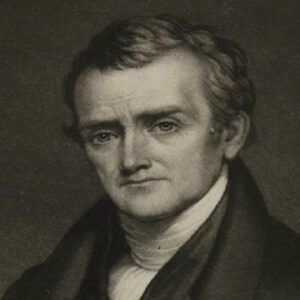Archibald Alexander was an American Presbyterian theologian and lecturer who founded and served as the first principal of Princeton Theological Seminary from 1812 to 1840. He is regarded as the first of the great “Princeton theologians” as a professor of theology. During Alexander’s tenure as principal, the Princeton’s strength and influence were felt across the United States. His life’s objective was to promote Christian ministry and to prepare for advising the masses about the scriptures. He also served as the president of Hampden Sydney College in Virginia for nine years and as the pastor of the Pine Street Presbyterian Church in Philadelphia before coming to Princeton. But it was at Princeton that he discovered his true calling in life. As the department’s chief professor, he devoted his entire focus to the promotion of the department’s pastoral and polemic theology activity. He was a prolific writer who wrote to the ‘Princeton Review’ with a number of essays. His works have been translated into a variety of languages and are used as textbooks in several universities.
Childhood and Adolescence
Archibald Alexander was born to William Alexander, a farmer and trader, in Rockbridge County, Virginia. His paternal grandpa was of Scottish ancestry but came from Ireland. He’d relocated from Ireland to Pennsylvania, then to Virginia.
Archibald was transferred to Rev. William Graham’s academy at Timber Ridge Meetinghouse (now known as Washington & Lee University) in Lexington when he was ten years old.
He became a tutor in General John Posey’s family when he was 17 years old. Mrs. Tyler, an elderly Christian lady who shared her religious experiences with him and fostered in him a genuine desire to learn the true meaning of God and religion, was there.
In 1789, he underwent a religious conversion that he dubbed “the great revival,” and he began studying divinity.
A Career of Archibald Alexander
He began preaching the Gospel after his religious conversion. He became an itinerant minister in Charlotte and Prince Edward counties for seven years after being ordained in the Presbyterian ministry in 1794.
In 1797, he was named president of Hampden Sydney College in Virginia, where he served for two years until 1806. He became the pastor of Philadelphia’s Pine Street Presbyterian Church in 1807.
In 1810, the College of New Jersey awarded him the degree of Doctor of Divinity. He was chosen president of Union College in Georgia the following year.
Alexander was the first professor at the Princeton Theological Seminary, which opened in Princeton, New Jersey, in 1812. From 1812 through 1840, he was the Seminary’s first principal.
In 1824, he helped form the Chi Phi Society with Robert Baird and Charles Hodge.
Major Projects of Archibald Alexander
‘Outlines of the Evidences of Christianity,’ his first significant work, was published in 1823 and has been translated into several foreign languages. In 1828, it was reissued in London, and in 1833, a second edition was published.
From 1829 through 1850, he was a regular contributor to magazines, with several of his articles appearing in the ‘Princeton Review.’
At the time of his death, he had several works in manuscript, some of which were published after his death. The most renowned of them was the 1852 publication of ‘Outlines of Moral Science.’
Personal History and Legacy
In 1802, Alexander married Janetta Waddel, the daughter of James Waddel, a famously expressive blind Presbyterian preacher.He was the father of seven children, six males and one daughter. Three of his sons went on to become pastors.
Estimated Net Worth
Archibald is one of the wealthiest religious leaders and one of the most well-known. Archibald Alexander’s net worth is estimated to be $1.5 million, according to Wikipedia, Forbes, and Business Insider.
Trivia
Archibald Alexander was his paternal grandfather’s name.
As a young boy, he was physically powerful and a great swimmer.
Charles Hodge, his protégé and successor, named his son Archibald Alexander Hodge after his master.
His personal materials, which date from 1819 to 1851 and include outgoing correspondence, manuscript writings, and lecture notes, are housed at the Presbyterian Historical Society in Philadelphia.


